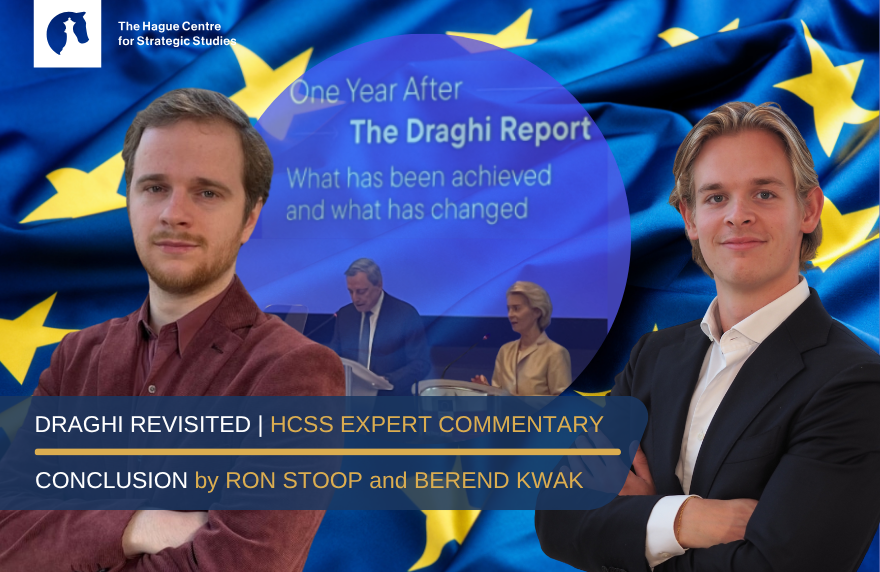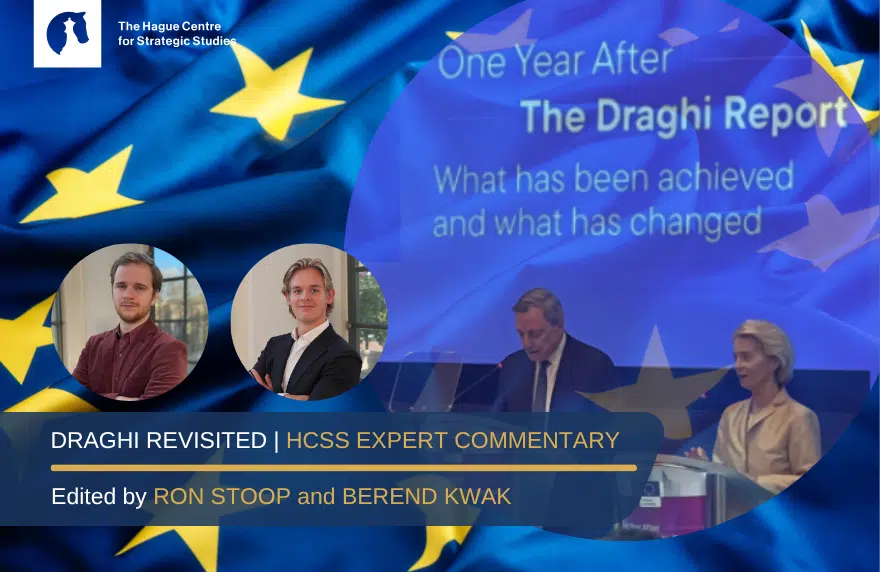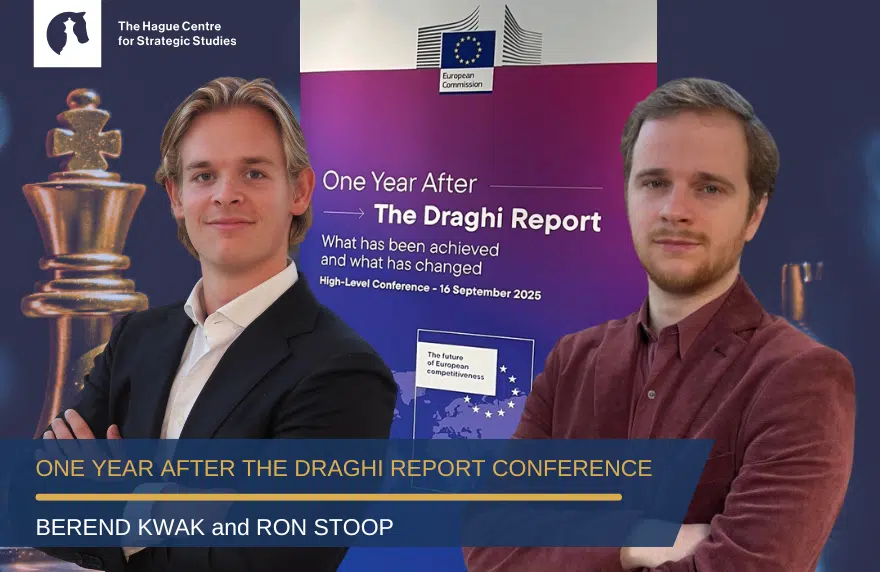Last year, strategic analysts Ron Stoop and Berend Kwak examined the long-term implications of the recommendations from the much anticipated “Draghi Report” on Europe’s economic future, in a series of interviews with our experts.
Now, one year later, we return to assess how far Europe has come in addressing Mario Draghi’s urgent call to secure its industrial, technological and economic sovereignty. Over the past few weeks, a range of experts and analysts working at the Hague Centre for Strategic Studies (HCSS) have provided deep dives into Draghi’s warnings, sector by sector.
For this final Draghi Revisited instalment, series editors Ron Stoop and Berend Kwak recap these new sectorial deep dives, to assess how far Europe has come in addressing the urgent call to secure its industrial, technological and economic sovereignty — and how far it still has to go.
One year after the publication of the Draghi report, progress on EU competitiveness remains uneven across sectors as well as limited overall. While significant new policy initiatives have been launched, such as the Competitiveness Compass and the Clean Industrial Deal, and the implementation of the CHIPS Act and the Critical Raw Materials Act are ongoing, Europe faces persistent problems with slow and fragmented implementation. Our HCSS experts have identified the developments and shortfalls of EU competitiveness on a sectoral level as they stand a year after Draghi’s publication.
Automotive
Europe’s automotive sector has undergone a turbulent year since the Draghi Report. While EV sales continue to rise and some European carmakers, notably Volkswagen and BMW, are advancing their electric transition, the pressure from Chinese automakers is mounting. According to our expert Ron Stoop, the EU’s tariff response to the influx of Chinese EVs has had mixed effects, partly because Plug-in Hybrid Vehicles (PHEV) were excluded, enabling continued growth of Chinese imports. At the same time, lobbying efforts to weaken emission targets and the 2035 combustion-engine ban threatens to slow Europe’s shift toward electric mobility. Looking ahead, the EU must hold firm on emissions policy, accelerate charging-infrastructure rollout and prioritise decarbonisation of corporate fleets with “buy European” provisions to secure industrial benefits. Real progress over the next year will depend on whether European carmakers truly pivot away from internal combustion engines and prove competitive in global EV markets.
Semiconductors
The EU invested in strengthening its semiconductor industry by installing the Chips Act and creating a Semiconductor Coalition to improve coordination between the Member States. These initiatives increased coordination and alignment of research and aimed to support public-private cooperation to boost Europe’s semiconductor economy. However, real measurable progress remains limited. Major projects have had to be cancelled or suspended due to cost pressures and regulatory constraints. Examples are semiconductor fabs in Germany and Poland planned by Intel. As our expert Benedetta Girardi noted, funding gaps and labour shortages also continue to undermine Europe’s ability to compete on a global scale. Private investment remains inadequate and permitting processes are too slow to attract sizeable new manufacturing capacity. The EU should prioritise streamlining its regulatory systems and improving labour availability. In addition, it should find ways to mobilise joint funding mechanisms with national and private partners to improve the business environment for high-tech manufacturing companies.
Critical Raw Materials
The Critical Raw Materials Act (CRMA) set out ambitious targets for European self-sufficiency and trade diversification. However, as our experts Irina Patrahau and Michel Rademaker pointed out, the level of implementation of these targets remains largely dependent on national level action, lacking concrete EU-wide steps. Individual Member States such as France and Germany host specific strategic CRM projects, but EU-level financing and coordination mechanisms remain insufficient. High costs and slow permitting processes, as well as local opposition, continue to impede progress. Recycling capacity and other circular economy investments show some growth, but still far below what Europe needs. The EU should focus on further accelerating strategic projects that it already identified under the CRMA, as well as introduce financial incentives to attract more developers. This should be combined with the development of shared stockpiling and refining capacities at the European level. Without these measures, the EU risks deepening its dependence on external suppliers.
Energy
While the EU has made some progress on energy diversification and reducing its import dependence on Russian fossil fuels, the fundamental challenges highlighted in Draghi’s report remain. As our experts Lucia van Geuns and Jilles van den Beukel observed, the combination of high energy costs with fragmented state-aid limit European competitiveness. A lack of market integration across the EU plays a major role. Several important initiatives such as collective procurement have been slow to materialise. Desired reforms in the electricity market and investments in the power grid lag behind as well. With the upcoming electricity market reform in 2026, the EU must focus on improved integration of the power grid and stabilising energy prices for industrial use. Additionally, it could promote incentives for long-term purchase-power agreements (PPAs). Ultimately, Europe’s competitiveness and decarbonisation goals are interdependent. Both require an integrated approach rather than competing national schemes, which is why Europe-wide coordination is specifically important for these sectors.
Clean Technologies
The Net Zero Industry Act (NZIA) and Clean Industrial Deal represent the EU’s most ambitious attempts so far to improve the conditions for a competitive cleantech ecosystem. However, as our experts Irina Patrahau, Ron Stoop and Berend Kwak noted, the transition from planning to measurable results has continued to progress slowly. Europe remains heavily dependent on imports for solar panels, batteries and electrolysers. Domestic production capacity upscaling is met by high costs and regulatory complexity. Permitting processes have improved, but in practice the development of new capabilities still lack speed. Moreover, grid congestion has grown into one of the main bottlenecks for industrial electrification, hampering the rollout of cleantech manufacturing. To stay competitive, Europe must focus on improving such infrastructure for the cleantech industry and shift its focus onto (sub)sectors where it still has capabilities to act. These sectors include wind power, grid infrastructure and possibly next-generation batteries. In addition, implementation of the NZIA should be done in a way that includes better guarantees for grid access and fast-track permitting. It should also focus on a coordinated state-aid framework to translate these plans into actual investments.
Energy-Intensive Industries (EII)
Energy-intensive industries, such as steel, chemicals, cement and plastics are at the core of any industrial base, including for Europe. Decarbonisation is essential for these industries to remain their license to operate and become fit for the future. However, despite the Clean Industrial Deal and Carbon Border Adjustment Mechanism (CBAM), progress on decarbonisation is still lacklustre. As our experts Ron Stoop and Berend Kwak argued, high industrial energy prices and a lack of consistent demand for low-carbon EII-products are the main problem, continuing to delay the necessary investment decisions. Projects in green steel and sustainable chemicals have been postponed, and national subsidy schemes remain uncoordinated across the EU. This complicates levelling the playing field for industrial companies within the EU. The top priority for the EU should therefore be to lower and stabilise industrial power prices and improve the investment climate for energy infrastructure companies.
Artificial Intelligence
Europe has shifted from a purely regulatory approach to more investment-driven steps on AI through the AI Continent Action Plan and InvestAI initiative. As our experts Sofia Romansky and Jesse Kommandeur noted, the new framework represents meaningful progress with plans to mobilise up to €200 billion in AI investment. In addition, the goal is to establish 15 AI Factories across Member States. As it is still in its early phases, adoption for now remains low: only around 13.5% of European enterprises have actively integrated AI into operations. Fragmented regulation as well as skills shortages and limited access to the necessary infrastructure and computing power create practical obstacles for the uptake of AI. The EU should now focus on applied AI within sectors that grant it a comparative advantage, such as manufacturing and healthcare. At the same time, simplifying regulatory standards for SMEs and investing in education can help improve the entrepreneurial climate and close the skills gap.
Defence
Since the Draghi Report, EU defence efforts have mostly advanced earlier reforms rather than breaking new ground. The exception was the ReArm/Readiness 2030 plan, but in terms of substance it was more of a continuation of the 2022 ‘big bang’ defence reforms after the full-scale Russian invasion of Ukraine. According to our defence expert Davis Ellison, despite these developments, fragmentation and nationally driven procurement persist. These bottlenecks have pushed EU states toward fast U.S. purchases that in the long run can weaken Europe’s industrial base. EU-wide ambition currently outstrips EU competences because defence remains largely national and exempt from EU single-market rules. Priorities now should include deeper cross-border capability development, streamlined governance between DG DEFIS and the EDA and closer NATO coordination. One of the key objectives of EU defence policy rationalisation would be the unifying of defence agencies and initiatives such as PESCO, EDF and ReArm into one coherent pan-European framework. This would increase coordination, effective decision-making and would prevent conflicts of interest and the doubling of efforts between EU bodies.
Conclusion
Europe’s central competitiveness challenge remains effective implementation. Policy frameworks are being developed, which is a good step and part of the answer to Draghi’s report. The next step is to overcome the constraints on progress caused by fragmented national execution, lack of funds and slow decision-making. The EU has set ambitious targets and is rolling out the policies to make those happen but struggles to translate them into industrial outcomes. As Draghi’s report emphasised, European competitiveness requires more scale, speed and coordination.
To move forward, the EU and its Member States must accelerate permitting and scale up funding to improve the delivery speed of strategic projects, particularly for clean energy, infrastructure and strategic industries such as semiconductors. In addition, they should expand financing models that allow the EU to leverage private funding to enable large-scale investment projects and ensure more stability for the industrial players. More finance needs to be directed towards priority sectors where Europe has potential for technological leadership.
One year after the Draghi Report, Draghi’s diagnosis still largely stands. Europe knows what to do but has failed to set the market conditions to realise its ambitions. Without addressing these problems, the EU risks staying a regulatory power instead of than an industrial one; capable of setting rules, but not of competing in the global economy.
Ron Stoop and Berend Kwak, November 19, 2025








